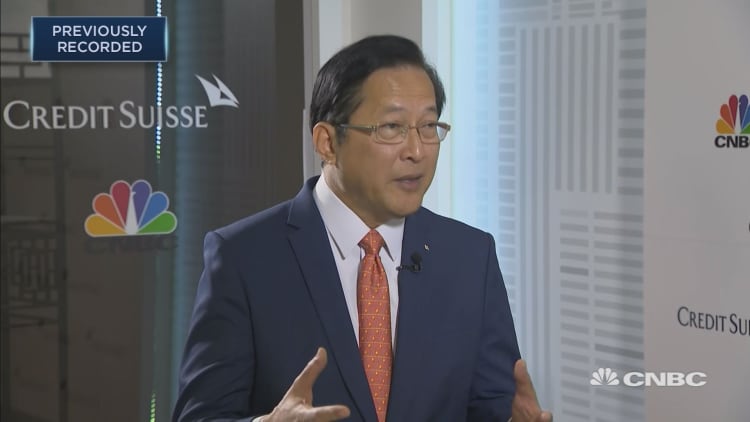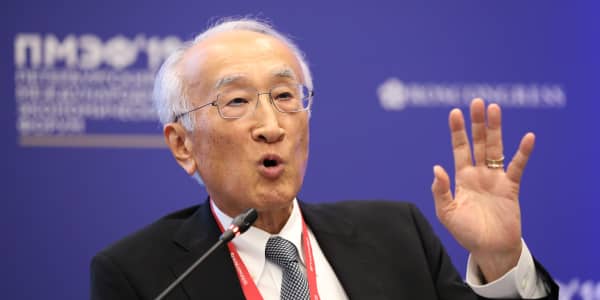
Global trends are changing many facets of business and politics. While some of those, such as protectionism and political tensions, may be hurting economies, there are still ways for investors to come out on top, according to Credit Suisse.
In a report issued at the Credit Suisse Global Supertrends Conference last week, the bank's Head of Economics and Research Nannette Hechler, and Daniel Rupli, head of single security research, went into "the most significant societal changes" that could result in tangible investment opportunities.
Such trends are set to drive more spending in sectors including defense and cyber security.
Meanwhile, the "Millennials tide" is just beginning, according to the bank, which referred to how people under the age of 30 are "increasingly influencing businesses and their values." That means that areas such as clean energy could be an important investment focus, it said.
Here are some sectors that Credit Suisse says will be boosted by major trends.
Security and defense
Investments in defense, safety and cybersecurity are expected to increase further on mounting threats, such as terrorism and international conflict.
"The danger to public safety from terrorist attacks, a fragile geopolitical situation, or threats from technology are among the key concerns of the public," the report said. The geopolitical environment, especially the situation in the Middle East, Syria and China Seas, "remains tense," it added.
Other examples highlighting the need for defense and security include Russia announcing it will deploy a hypersonic missile system and a massive data breach at Marriott's Starwood Hotels database.
The protection of personal data is "high on the political agenda," and so investments in cybersecurity are likely to be a top priority for governments and corporations, according to the report.
"In addition, given the rapid technological change and interstate strategic competition — which have overtaken terrorism as the primary concern for US national security — defense spending is set to increase further, for instance in areas such as space, Artificial Intelligence, cyber or hypersonic technology," the report said.
Clean energy
Public pressure on politicians to rely on renewable energy instead of fossil fuels will continue to intensify as climate activism takes off, according to the report.
Therefore, government policy is expected to become "more ambitious" in setting near- and medium-term renewable energy targets, Credit Suisse said.
It says, as a result, this will have a "profound impact" on utility companies. It recommends electricity companies that have already started changing their business models to become renewable energy operators.
In particular, the bank recommends operators that own large assets that produce electricity from solar and wind, over equipment and technology suppliers for renewable energy projects.
Those assets, according to the report, can "produce reliable and long-term revenue streams without re-occurring input costs."
"In Europe, investors still seem to underestimate the positive earnings impact that will come from implementing cheaper wind and solar energy into their generation mix," the report said, adding that the full future growth potential of any renewable energy infrastructure has not yet been priced in.
Transport and infrastructure
Credit Suisse is bullish on transport infrastructure operators such as those of airports, toll ways and railways, saying that such businesses have strong growth ahead.
For instance, the publicly listed Airports of Thailand has benefited from strong passenger numbers, which have jumped threefold over the past 10 years.
The bank also flagged French construction giant Vinci, pointing out that it is growing further through acquisitions — it had acquired Gatwick Airport in December 2018, and intends to buy Aeroports de Paris.
Infrastructure is a theme back in focus for investors this year, said Credit Suisse, pointing out that the G-20 projects that the global infrastructure gap — the shortfall between required infrastructure and expected projects — will widen to $14.8 trillion by 2040.
"A potential trade deal between the U.S. and China would remove a big uncertainty for global infrastructure projects," the Credit Suisse report said.
With the U.S. Federal Reserve turning dovish and holding off interest rate hikes, it could be good news for companies that have been pressured by higher financing costs for their infrastructure projects, according to the bank.
It pointed to the recent gains in the MSCI World infrastructure index, which had shot up 9.97% year-to-date, as of March 29.
The index includes sectors such as telecommunications, utilities, airport services and health-care facilities, among others.
5G
This year could be when companies finally benefit from the initial launches of 5G technology, Credit Suisse said.
South Korea launched 5G commercially at the end of 2018, while the U.S. introduced standards for the ultra-high-speed data network. The next major launches are expected to be in Japan, China and Europe — but not before 2020, according to the bank.
Its focus, then, would be on 5G-related infrastructure providers, such as data centers, telephone tower companies and equipment providers for 5G telecommunications assets, it said.
For instance, telephone tower companies may generate strong growth from the upcoming 5G implementation. Demand for wider bandwidth will go up, and the transmission distance between towers must shorten, to achieve seamless 5G coverage, Credit Suisse said.
As a result, more towers will be acquired or merged to increase the coverage, the bank said, pointing to a recent move by telecommunications companies Telecom Italia and Vodafone Italia to enter into a 5G network sharing agreement.





